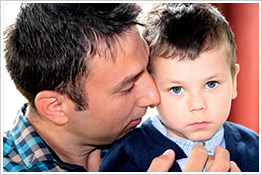Go and Do Likewise
By Marjorie F. Eddington
Categories: Expressing God, Golden Rule, Jesus (Parables), Jesus' Commandment - To Love as He Loved, Relationships “Go and do likewise,” Jesus directed after he finished the story of the Good Samaritan (Luke 10:37 NIV). What is the likewise we’re going and doing? Showing mercy.
 The world today is in desperate need of mercy—in need of God’s blessing, divine favor, and compassion. All we have to do is turn on the news to see the effects of offenders who terrorize others, spread prejudice, incite fear, and kill innocent children of God (Dallas, Orlando, France, Turkey, ad infinitum). And this can easily make us angry. We may feel the need for vengeance. We may want to punish or even destroy the perpetrators. But what example do we want to set for our children? What type of world do we want for them? The world today is in desperate need of mercy—in need of God’s blessing, divine favor, and compassion. All we have to do is turn on the news to see the effects of offenders who terrorize others, spread prejudice, incite fear, and kill innocent children of God (Dallas, Orlando, France, Turkey, ad infinitum). And this can easily make us angry. We may feel the need for vengeance. We may want to punish or even destroy the perpetrators. But what example do we want to set for our children? What type of world do we want for them?
In no way, shape, or form am I suggesting that we skip out on justice or ignore terrorists of any kind. Indeed, we must stand up to them with moral courage and might so that we stop them. We must defend our right to peaceful existence. There are reasons for laws—safeguarding life, liberty, human dignity, harmony. What I’m addressing is how we respond as individuals in our own lives, homes, spheres of influence—how we can show mercy.
Mercy, as it applies to humanity, is “compassion or forbearance shown especially to an offender or to one subject to one's power … compassionate treatment of those in distress” (Merriam-Webster). Another way of thinking of mercy is being kind to those whose actions aren’t “deserving” of kindness, or giving people a second chance.
It would seem easy to treat those in distress with mercy, but not necessarily. Jesus’ Samaritan was an outcast. The Jews were prejudiced against the Samaritans at that time, so why should a Samaritan show any compassion to the distressed Jew who had been beaten and left for dead? Why indeed? Because he was a fellow human. He was not a race, not a religion, not a political party, not even an enemy. The Samaritan saw this downtrodden man as a man, just like himself. A man in need of mercy.
It is this ability to show mercy, compassion, forbearance, tenderness, attentive care to those in distress, as well as to offenders, that Jesus tells us to emulate. Are we doing likewise? Are we following Jesus’ example? What are our children seeing us do?
When children talk back, fight, throw tantrums, lie, rebel, or do any of the various things children may do, what is our response to their distress call? Do we yell, lash out at them, try to teach them a lesson with forms of punishment? Isn’t that saying that it’s okay to yell, lash out, and punish others with anger? That doesn’t mean we let them off the hook for what they’ve done. It’s how we treat them that matters. The law/rule doesn’t change, but how we enforce limits and laws makes all the difference in the world.
Punishment, angry outbursts, vitriolic words and actions just continue the cycle of violence. But mercy, empathy, compassion have the power to lift us out of the vicious cycle and enable us to start over on the basis of respect. Just think about what a compassionate, empathetic response might do for the one who injured us. It may be hard to show kindness to those who are unkind to us. But is there really any other Christian, Christ-like, alternative?
Jesus declared: “I say, love your enemies! Do good to those who hate you. Bless those who curse you. Pray for those who hurt you” (Luke 6:27, 28 NLT). Jesus led by example. He didn’t say one thing and do another. When he got nailed to the cross, he forgave: “Father, forgive them, for they do not know what they are doing” (Luke 23:34 NIV).
Are we doing likewise? Are we compassionate to our children who, when they act out in anger are acting out their pain and are in desperate need of mercy and love? Are we patient and calm, even silent, when someone attacks our integrity or identity with insults and lies? Are we taking responsibility for whatever is our part in the conflict and also helping the others heal whatever is making them angry by responding with respect, mercy, and love?
The very nature of our world and its existence depends upon our ability to “go and do likewise,” to show mercy, to treat others with kindness even if they don’t act kindly. Our children’s future depends upon us making the merciful choice, and making it now. |